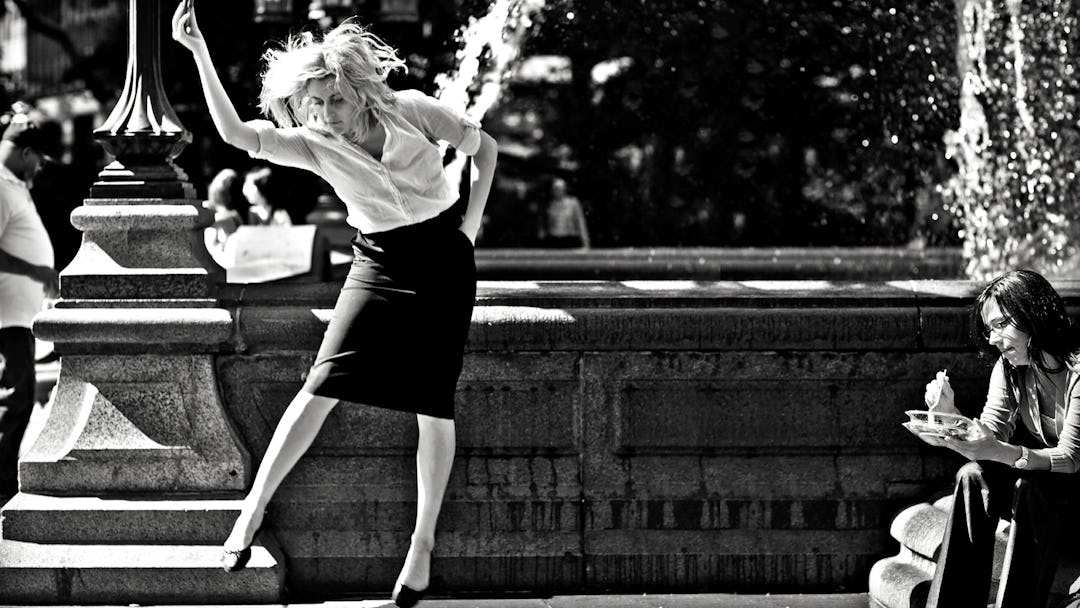Anyone who saw Greta Gerwig providing the soft, gooey center for Noah Baumbach’s sharply acidic Greenberg would understand why he’d want to cast her again; as the accidental love interest to Ben Stiller’s misanthrope, she gave a performance so nuanced yet winning and deeply felt that it sent anyone who observed it reeling for synonyms for “star quality.” His initial idea for their follow-up, Frances Ha, was vague: “I just had more general ideas that it would be something in New York and something in black and white and something with Greta,” he recalls. “I didn’t really know more than that — and maybe something that felt sort of European to me, some, like, story of youth.” But he wasn’t interested in solely collaborating as actor and director. “I suppose I had an instinct, to kind of involve her in the process of coming up with what it was going to be.” Gerwig jokes that his motivations may have been more pragmatic. “I think part of it was, he was like, ‘You’re cheap, right?’”
On Greenberg, Gerwig explains, “we just had a real shorthand real quickly, and for whatever reason, he thought we’d write well together. He asked me if I had any ideas, and I sent this list with three pages of stuff and he said, ‘This looks pretty great,’ and he started adding ideas and then just this document just started growing and that became the script.” At that point, Baumbach says, “I just felt like we could see the movie in some way and it just felt like this was something we should do together. But I don’t know if we’ve even had the conversation like, ‘Let’s co-write this.’ It was more like it just became a kind of conversation, an email, that started to turn into a script.”
The looseness of the arrangement extended into the writing process, Baumbach says. “There was nothing deliberate in it. We kind of just felt very in sync in writing it, to the point that we would even divvy up scenes and write them separately and then we’d send them back and forth and rework them together. But there was no danger in that because everything felt of the same piece — and I don’t know why that is except that we connected very strongly about the material and the character.” Appropriately, the resulting script really does feel like the best of both worlds: it has the tight, literary dialogue and formalist cinematic allusions typical of Baumbach’s work, but it also has the loose, off-the-cuff feel of the low-budget, semi-improvised films that Gerwig cut her teeth on.
“It was actually the best thing for me,” Gerwig says, “because I love writing and I’d written a lot in college, and I’d collaborated on these — they weren’t screenplays, they were ‘devised’ movies, so we would devise these characters and these plots, but then we would improvise them. So I felt like I’d really been yearning to write precise text and write a real thing from start to finish. And I’m so happy we got to do it together, because it felt like a really natural collaboration and I didn’t feel like either one of our voices was compromised in it. You know, though he’s clearly the more accomplished of the two writers, he was never like, ‘Which one of us have an Academy Award nomination and which one of us doesn’t?!’ Although he could have said that.”
Most refreshingly, Frances Ha apes the tone and style of a romantic comedy while remaining utterly uninterested in matters of romance. In fact, the relationship that becomes the picture’s primary focus is the friendship between our protagonist, listless 27-year-old modern dancer Frances (Gerwig), and her best friend Sophie (Mickey Sumner) — though it is cleverly mapped in the beats of your typical rom-com. “We did that on purpose,” Gerwig whispers, with a laugh. “We actually went through the script and we tried to beat it out like a romantic comedy, like, she has the girl, that’s perfect, she loses the girl, she gets angry, she tries to get the girl back, she tries to make the girl jealous, then she rejects… We were trying to actually do that arc with the friendship so it was conscious: Frances is in love with her best friend, and Sophie is trying to establish a more adult friendship with her.”
“In earlier drafts, maybe it was gonna be more friends, like a group of friends,” Baumbach explains. “But it all kind of became Sophie, and I think that central relationship — which is in some ways set up as a romantic comedy story — that discovery, that’s when the movie really started to click.”
And it does, thanks in no small part to the considerable chemistry between Gerwig and co-star Sumner. They genuinely feel like longtime friends in the film — and in their interview, where they laugh and joke and top each other like their onscreen avatars. Surprisingly, they met at the audition: “I didn’t know Greta was involved in the movie at all until my third audition,” Sumner says, “when I walked into my third callback and Greta was sitting there and I was like, ‘Oh, it’s a Greta Gerwig movie!’” But once she was cast, the pair had no trouble generating the proper chemistry. “It’s just easy,” Sumner says. “She’s not someone you have to work hard at loving, you just meet her and you’re like, ‘I just wanna be close to her!’”
Gerwig chimes in: “I feel the same way about you, Mickey!”
And Sumner sums up the relationship, and the film: “It’s a love fest!”
Frances Ha is out tomorrow in limited release.
